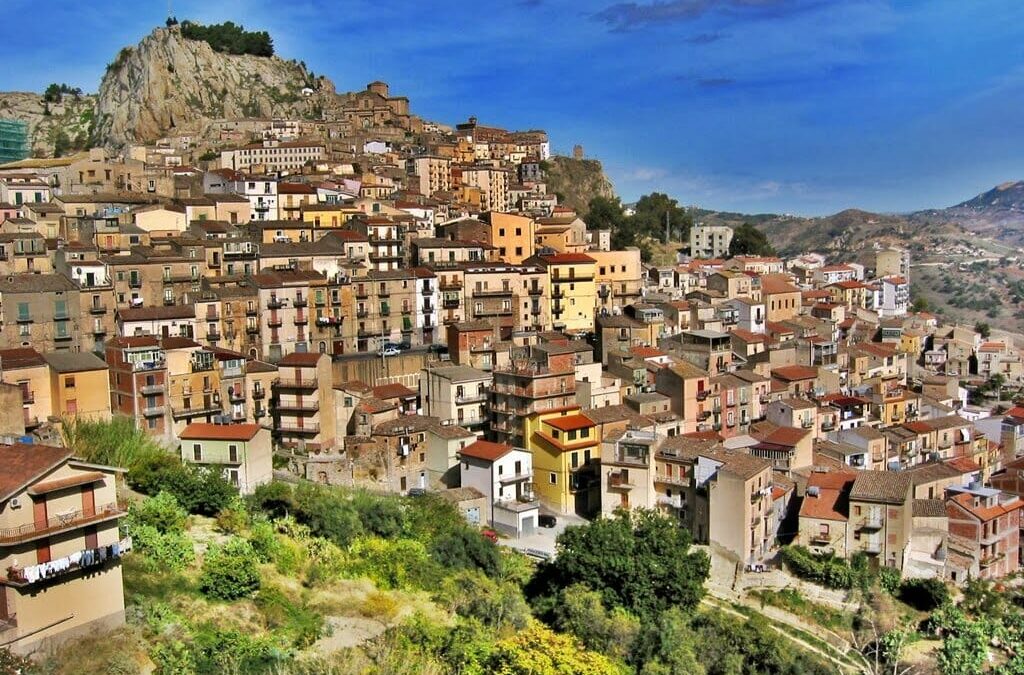
Oct 24, 2015 | Non categorizzato
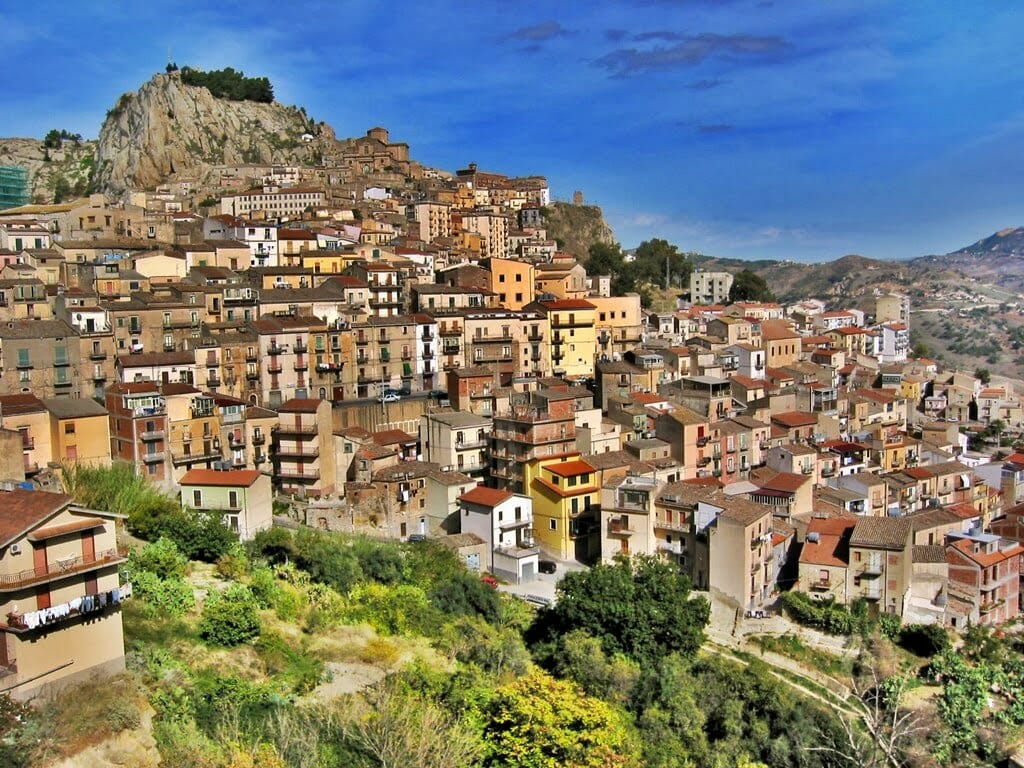 “I live in Nicosia and was born and grew up in an Orthodox family that was Christian in name only. There was no depth, no relationship with Jesus. Indeed, God was the ally of my parents, and they seemed to have a monopoly on Him when they wanted us to obey them. When I finished high school, I received a scholarship to study orthodontics in Hungary. It was difficult for me to get used to the new sitaution. For the first time I was far from my family, living with people I didn’t know. Back then, we were far from the multicultural spirit that prevails today. I was filled with prejudices, with an attitude of rejection. During that year I encountered many disappointments, also from my friends. Meanwhile, the deep search for a more authentic life had begun in me. At the new college I met a Hungarian girl. I had been struck by her cheerfulness and also the way she accepted others. She even offered to help me learn Hungarian. Disappointed by my previous experience with friends, her way of acting made me wonder: ‘Is she sincere, or only kidding?’ But . . . I began to trust her. We shared joys, sorrows, failures and also material things. When she went home to her family on the weekends, around 50 km from Budapest, she took me along so that I wouldn’t be missing my own family. Her family were farmers, very loving, warm and hospitable. But there was one question: Every day at the same hour, and one evening every week she would disappear without explanation. All I knew was that she was with other friends. It turns out that she was with several young women who belonged to the growing Focolare community in Hungary. Back then – when were under the Socialist Regime – anyone discovered belonging to a religious movement was persecuted with serious consequences, such as loss of one’s job, or place at university. One day she felt comfortable enough to confide in me. She told me how she had come to know the Focolare Movement. A priest from her village had recounted to her the story of Chiara Lubich, a young woman like us, of our same age, and how she had been struck by the fact that during the Second World War, Chiara saw everything crumbling around her and the only ideal that didn’t crumble under the bombs was God. She wanted God to be her ideal in life, and to live according to His will. She explained to me that she and those young women she met with were trying to do the same thing. They placed God first in their life, living the Word of Life each day, a sentence taken from the Gospel with an explanation by Chiara. Then they recounted their daily experiences to each other, as a gift for each other. Everything she told me touched me so deeply, I began reading the New Testament, which I had never done before, and this was a decisive moment for my future. Life began to change. All the people I met each day, I could no longer ignore them, nor judge them, nor undervalue them, because now a new mentality had been born in me: we’re all children of One Father and therefore brothers and sisters to each other. Every person is a candidate for the unity that Jesus asked of His Father: that all may be one: the good, the bad, the ugly, the unlikeable, the big and the small. . . The theology of the Fathers had been awakened in me, especically that saying of Saint John Chrysostom: ‘I see my brother, I see my God’. The walls of prejudice that I built up within me, began to crumble. I realised that the Gospel was not only something to be read out in church and that was it; rather, it could bring about a revolution if we took it seriously and translated it into daily life: at the university, at the factory, at the hospital, in the family! Amidst all of this enthusiasm and joy that was filling my life, there was one great sorrow: The other girls were all Catholics, and I was the only Orthodox. They attended Mass every day. I strongly desired to be with them in those moments, but they suggested that I look for my Orthodox Church in Budapest so that I could attend the Liturgy and receive the Eucharist. This separation was painful, but Chiara had invited the members of the Movement belonging to other Christian Churches, to love their Churches, just as she had loved hers. This explanation gave me peace and, once again, it confirmed in me the wisdom, love and descretion that Chiara possessed in front of the believers of different Churches. It could not have been anything but the fruit of God’s intervention in our times. I found the Orthodox parish and got to know it more. I went every Sunday and, with the permission of the priest was able to receive Holy Communion any time there was a Divine Liturgy. They never left me alone in this new initiative. The other young Catholic women often attended the Liturgy with me. The liturgical and sacramental life was no longer something formal or external, but a relationship that was building with Jesus, the activation of God’s grace in my heart that helped in the daily struggles and increased the fruits of love, joy and peace within me.” At Istanbul, March 14, 2015, on the occasion of the publication of the Greek editions of Chiara Lubich’s writings.
“I live in Nicosia and was born and grew up in an Orthodox family that was Christian in name only. There was no depth, no relationship with Jesus. Indeed, God was the ally of my parents, and they seemed to have a monopoly on Him when they wanted us to obey them. When I finished high school, I received a scholarship to study orthodontics in Hungary. It was difficult for me to get used to the new sitaution. For the first time I was far from my family, living with people I didn’t know. Back then, we were far from the multicultural spirit that prevails today. I was filled with prejudices, with an attitude of rejection. During that year I encountered many disappointments, also from my friends. Meanwhile, the deep search for a more authentic life had begun in me. At the new college I met a Hungarian girl. I had been struck by her cheerfulness and also the way she accepted others. She even offered to help me learn Hungarian. Disappointed by my previous experience with friends, her way of acting made me wonder: ‘Is she sincere, or only kidding?’ But . . . I began to trust her. We shared joys, sorrows, failures and also material things. When she went home to her family on the weekends, around 50 km from Budapest, she took me along so that I wouldn’t be missing my own family. Her family were farmers, very loving, warm and hospitable. But there was one question: Every day at the same hour, and one evening every week she would disappear without explanation. All I knew was that she was with other friends. It turns out that she was with several young women who belonged to the growing Focolare community in Hungary. Back then – when were under the Socialist Regime – anyone discovered belonging to a religious movement was persecuted with serious consequences, such as loss of one’s job, or place at university. One day she felt comfortable enough to confide in me. She told me how she had come to know the Focolare Movement. A priest from her village had recounted to her the story of Chiara Lubich, a young woman like us, of our same age, and how she had been struck by the fact that during the Second World War, Chiara saw everything crumbling around her and the only ideal that didn’t crumble under the bombs was God. She wanted God to be her ideal in life, and to live according to His will. She explained to me that she and those young women she met with were trying to do the same thing. They placed God first in their life, living the Word of Life each day, a sentence taken from the Gospel with an explanation by Chiara. Then they recounted their daily experiences to each other, as a gift for each other. Everything she told me touched me so deeply, I began reading the New Testament, which I had never done before, and this was a decisive moment for my future. Life began to change. All the people I met each day, I could no longer ignore them, nor judge them, nor undervalue them, because now a new mentality had been born in me: we’re all children of One Father and therefore brothers and sisters to each other. Every person is a candidate for the unity that Jesus asked of His Father: that all may be one: the good, the bad, the ugly, the unlikeable, the big and the small. . . The theology of the Fathers had been awakened in me, especically that saying of Saint John Chrysostom: ‘I see my brother, I see my God’. The walls of prejudice that I built up within me, began to crumble. I realised that the Gospel was not only something to be read out in church and that was it; rather, it could bring about a revolution if we took it seriously and translated it into daily life: at the university, at the factory, at the hospital, in the family! Amidst all of this enthusiasm and joy that was filling my life, there was one great sorrow: The other girls were all Catholics, and I was the only Orthodox. They attended Mass every day. I strongly desired to be with them in those moments, but they suggested that I look for my Orthodox Church in Budapest so that I could attend the Liturgy and receive the Eucharist. This separation was painful, but Chiara had invited the members of the Movement belonging to other Christian Churches, to love their Churches, just as she had loved hers. This explanation gave me peace and, once again, it confirmed in me the wisdom, love and descretion that Chiara possessed in front of the believers of different Churches. It could not have been anything but the fruit of God’s intervention in our times. I found the Orthodox parish and got to know it more. I went every Sunday and, with the permission of the priest was able to receive Holy Communion any time there was a Divine Liturgy. They never left me alone in this new initiative. The other young Catholic women often attended the Liturgy with me. The liturgical and sacramental life was no longer something formal or external, but a relationship that was building with Jesus, the activation of God’s grace in my heart that helped in the daily struggles and increased the fruits of love, joy and peace within me.” At Istanbul, March 14, 2015, on the occasion of the publication of the Greek editions of Chiara Lubich’s writings.
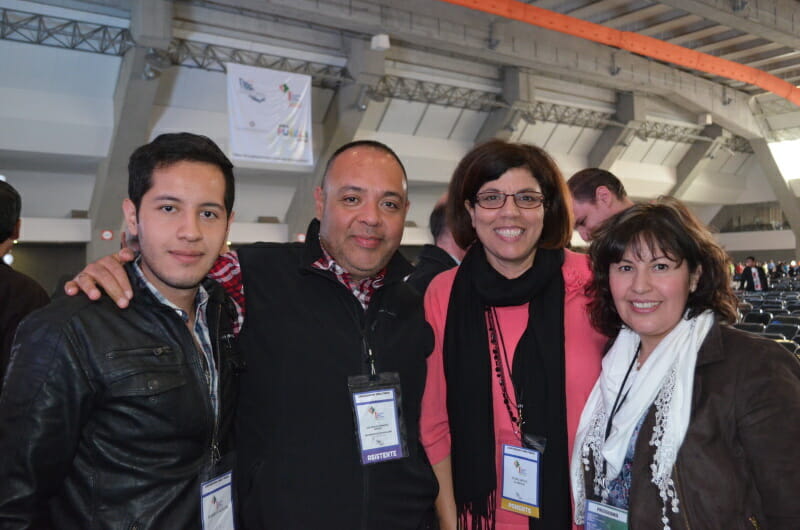
Oct 23, 2015 | Non categorizzato
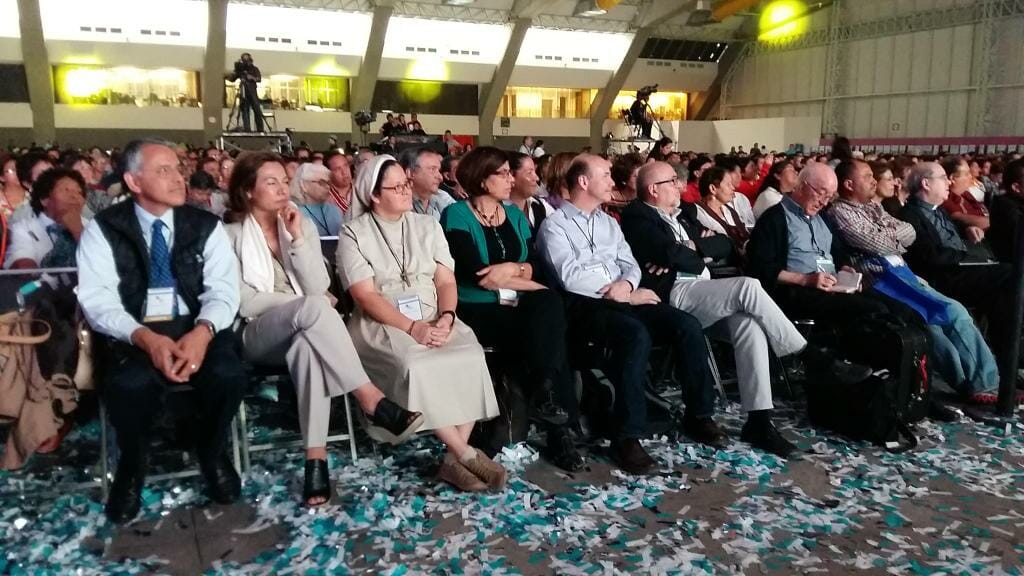 “It’s a historic event”; “There’s no turning back”; “Only through our communion will we solve the problems of Mexico.” These were some of the phrases that were joyfully echoing in the corridors of the Centro Expositor, an avant-garde but functional structure that adds to the already rich architectural patrimony of the city of Puebla. The slogan “Young people, family and life united in the joy of the New Evangelisation” was the backdrop of the three-day conference (October 16-18, 2015). Accompanying the reflections presented at the main assembly, there was also a series of reports and roundtables, with twenty simultaneous focus groups that strengthened awareness in the thousands of participants, of the important social role that comes with being part of a Church movement.
“It’s a historic event”; “There’s no turning back”; “Only through our communion will we solve the problems of Mexico.” These were some of the phrases that were joyfully echoing in the corridors of the Centro Expositor, an avant-garde but functional structure that adds to the already rich architectural patrimony of the city of Puebla. The slogan “Young people, family and life united in the joy of the New Evangelisation” was the backdrop of the three-day conference (October 16-18, 2015). Accompanying the reflections presented at the main assembly, there was also a series of reports and roundtables, with twenty simultaneous focus groups that strengthened awareness in the thousands of participants, of the important social role that comes with being part of a Church movement. 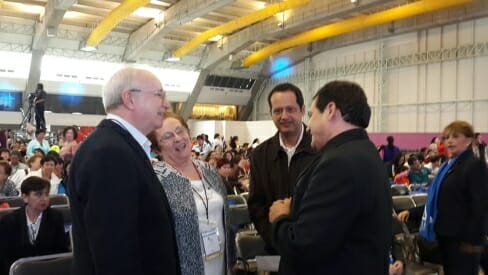 The first report was presented by Anna and Alberto Friso, members of the Pontifical Council for the Family, who examined the challenges to an institution that is more and more under attack due to the influence of individualism , but which remains as a light for society precisely because it is a “little church”. A variety of academics, civil leaders and members of the most prestigious institutions in the country, such as IMDOSOC, Mexicanos Primeros, A favor de lo mejor, México Evalúa and others, offered interesting presentations that helped to understand this North American country from many different angles: politics, mass media, education and social action. Among the testimonies there were also three aritsts of international fame: Liana Rebolledo, Eduardo Verástegui and Emmanuel. A very touching testimony was given by Margaret Karran, an Arab Christian focolarina from Haifa who up to a short time before had lived in the Holy Land in direct contact with the diverse religious expressions that are found there.
The first report was presented by Anna and Alberto Friso, members of the Pontifical Council for the Family, who examined the challenges to an institution that is more and more under attack due to the influence of individualism , but which remains as a light for society precisely because it is a “little church”. A variety of academics, civil leaders and members of the most prestigious institutions in the country, such as IMDOSOC, Mexicanos Primeros, A favor de lo mejor, México Evalúa and others, offered interesting presentations that helped to understand this North American country from many different angles: politics, mass media, education and social action. Among the testimonies there were also three aritsts of international fame: Liana Rebolledo, Eduardo Verástegui and Emmanuel. A very touching testimony was given by Margaret Karran, an Arab Christian focolarina from Haifa who up to a short time before had lived in the Holy Land in direct contact with the diverse religious expressions that are found there.

Margaret Karram (second from right)
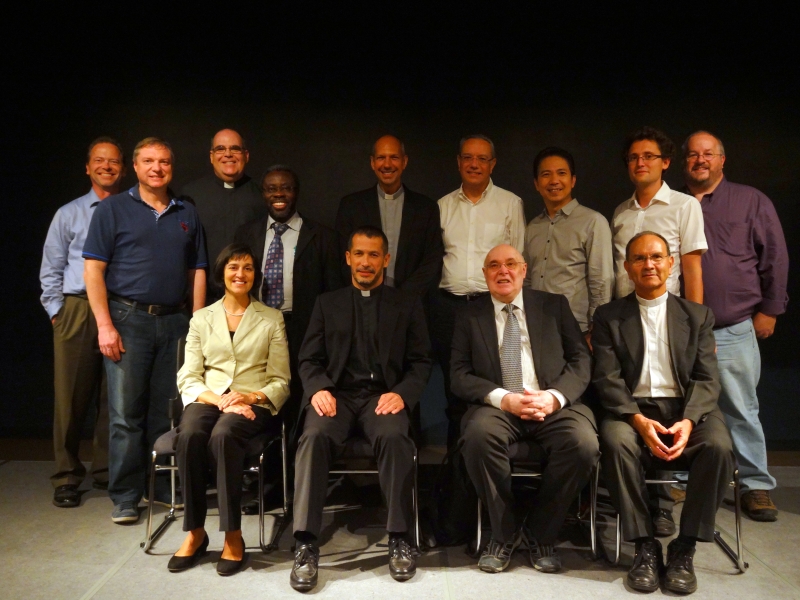
Oct 22, 2015 | Non categorizzato
 “The place of my dreams, ever since I was small, was Canada. I would certainly never have dreamed of actually going there, much less in a town called Saskatoon in the prairies of Saskatchewan. Even more beautiful was the reason that brought me there. I went to take part in the final session of the Consultation between the World Evangelical Alliance (WEA) and the Pontifical Council for Promoting Christian Unity of which I have been a member since 2009. I thought back over some experiences that were undertaken with Lutherans in South Brazil that followed a safe path. But with the first contact, I immediately realised that here it was another reality. I encountered a group of Evangelicals – in some countries they are called ‘Evangelists’, in others ‘Evangelicals’. There was a group of Christians included amongst them from different churches: Lutheran, Reformed, Baptist, Pentecostal, Mennonite and Anglican. They identified with a common missionary project, while living and being Church in very different ways from one another. There were thirteen of us – five Catholics and eight Evangelicals. I was the only lay person, and a woman. They came from Brazil, Canada, Colombia, Philippines, Germany, Guatemala, Italy, Kenya, Spain and the United States. It was an unforgettable week marked by prayer, study, reflection and, at times, heated discussions. The questions we asked helped us to know one another better, especially on a confessional and missionary level: What do we have in common? What still divides us? The diversity I encountered was a valuable enrichment and a serious challenge. Above all, we tried to clarify our positions in order to overcome the conflicts through truthful dialogue in charity. It wasn’t easy, and there wasn’t a lack of problems. We experienced the pain of the divisions. We realised that the road ahead would be long. What to do? Let it go, or carry on? Personally, I discovered that any obstacle can become an opportunity for dialogue and an invitation to have an even greater measure of love. We faced the problems in the light of the Gospel, working like real disciples of Christ. Amongst the Catholics were bishops, priests and laity; and we also came from different countries and backgrounds, different points of view. Yet, together, we managed to have a living experience of full and real communion which we enjoy. This is fraternal communion born over years together, along with the hope that every one of us can contribute something towards the reconciliation between Catholics and Evangelicals in our own country. Now, we are awaiting the publication of the final report of this Consultation. Because of the personal friendship established with them, Pope Francis has triggered a new ‘march’ of this dialogue. Encouraged by him, we would like to promote this experience everywhere, because it is in the local community that we live with one another; it is there that we forgive one another; and it is there that we offer the witness that Jesus asks us for: “By this everyone will know that you are my disciples, if you have love for one another” (Jn 13:35).
“The place of my dreams, ever since I was small, was Canada. I would certainly never have dreamed of actually going there, much less in a town called Saskatoon in the prairies of Saskatchewan. Even more beautiful was the reason that brought me there. I went to take part in the final session of the Consultation between the World Evangelical Alliance (WEA) and the Pontifical Council for Promoting Christian Unity of which I have been a member since 2009. I thought back over some experiences that were undertaken with Lutherans in South Brazil that followed a safe path. But with the first contact, I immediately realised that here it was another reality. I encountered a group of Evangelicals – in some countries they are called ‘Evangelists’, in others ‘Evangelicals’. There was a group of Christians included amongst them from different churches: Lutheran, Reformed, Baptist, Pentecostal, Mennonite and Anglican. They identified with a common missionary project, while living and being Church in very different ways from one another. There were thirteen of us – five Catholics and eight Evangelicals. I was the only lay person, and a woman. They came from Brazil, Canada, Colombia, Philippines, Germany, Guatemala, Italy, Kenya, Spain and the United States. It was an unforgettable week marked by prayer, study, reflection and, at times, heated discussions. The questions we asked helped us to know one another better, especially on a confessional and missionary level: What do we have in common? What still divides us? The diversity I encountered was a valuable enrichment and a serious challenge. Above all, we tried to clarify our positions in order to overcome the conflicts through truthful dialogue in charity. It wasn’t easy, and there wasn’t a lack of problems. We experienced the pain of the divisions. We realised that the road ahead would be long. What to do? Let it go, or carry on? Personally, I discovered that any obstacle can become an opportunity for dialogue and an invitation to have an even greater measure of love. We faced the problems in the light of the Gospel, working like real disciples of Christ. Amongst the Catholics were bishops, priests and laity; and we also came from different countries and backgrounds, different points of view. Yet, together, we managed to have a living experience of full and real communion which we enjoy. This is fraternal communion born over years together, along with the hope that every one of us can contribute something towards the reconciliation between Catholics and Evangelicals in our own country. Now, we are awaiting the publication of the final report of this Consultation. Because of the personal friendship established with them, Pope Francis has triggered a new ‘march’ of this dialogue. Encouraged by him, we would like to promote this experience everywhere, because it is in the local community that we live with one another; it is there that we forgive one another; and it is there that we offer the witness that Jesus asks us for: “By this everyone will know that you are my disciples, if you have love for one another” (Jn 13:35).
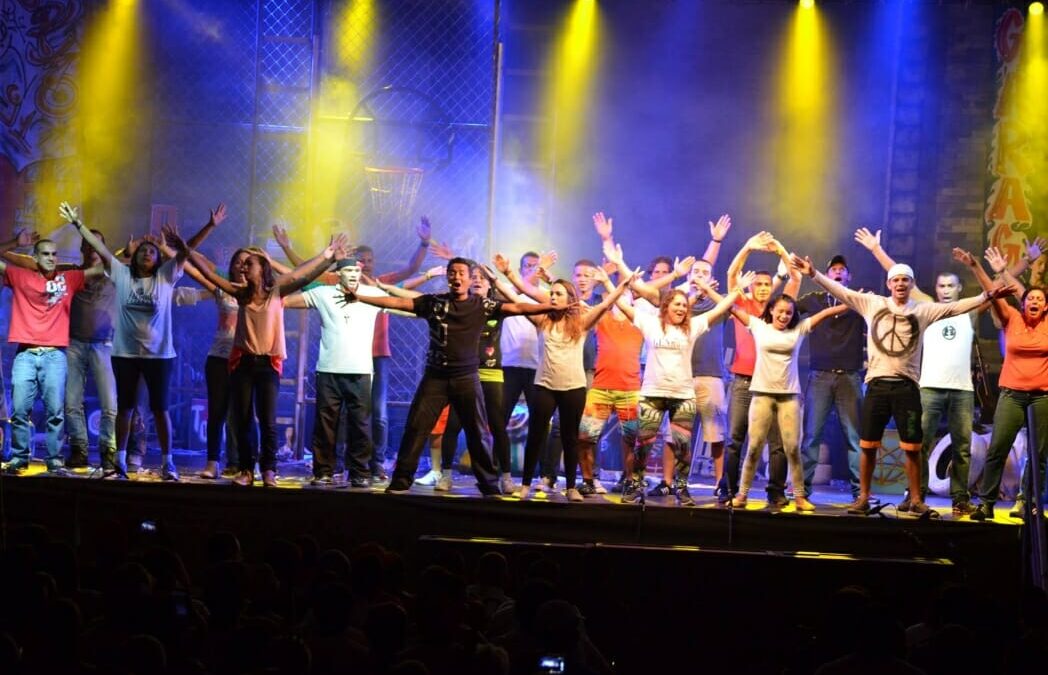
Oct 21, 2015 | Non categorizzato
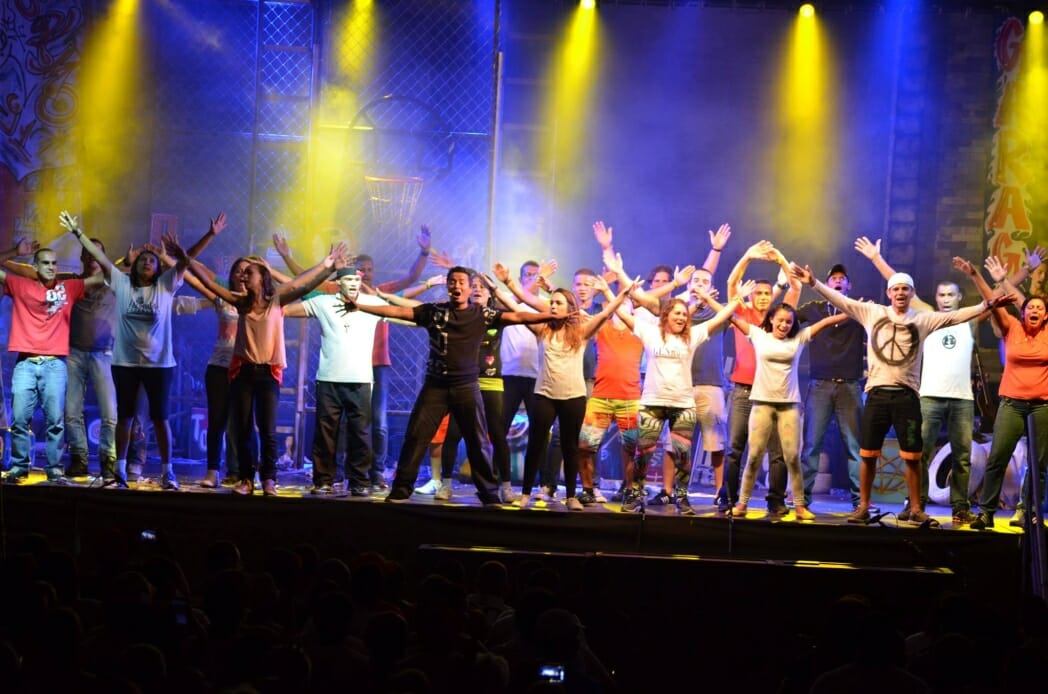 These are the figures of Gen Rosso’s tour in Brazil: the band that resides in Loppiano has undertaken seven projects – one for every city – in collaboration with Fazenda da Esperança – a community founded in 1983 by Frei Hans, Nelson, Lucy and Iraçi – and the prefecture of Guarapuava. The first city to host the band was Palmas, in the state of Tocantins where the Fazenda da Esperança hosts 25 youths under rehab programmes from drugs, alcohol and violence, and who will work with Gen Rosso – together with other youths of other 4 Fazende in neighbouring cities – and take part of an intense workshop through which they will not only stage their musical Streetlight, but also undertake a spiritual journey of communion. Also 170 youths of the Focolare Movement of various parishes and diocesan movements will participate in the nine artistic workshops. The two evening shows resulting from the workshops attracted an audience of 2,300 people, as well as the national TV Globo channel, other media and the local civil and religious authorities. Also the second third stopover in Caxias and Manaus, in the states of Maranhão and the Amazon, followed the same pattern: the spirit of the tour is to involve the youth, especially those with difficult backgrounds and vicissitudes, within a programme of education towards peace and a different lifestyle transmitted through music, dance and mutual sharing. There were numerous touching testimonials in this sense: «I have lived for two years in the square of the theatre, sleeping on that bench in front, and ate what I found in the trashcans… I never thought that I would one day see what was behind those doors, and even go onstage to express my wish for redemption and a new life,» a boy from Manaus said. «I was familiar with the backstage door. I would enter to steal and when it was closed, it was the corner where I would assume drugs . And now, here I am, trying to give the best of myself: life is marvelous!» another boy relayed. Also the audience wrote very meaningful impressions – the final celebrations in Manaus saw the participation of 6,000 people – among these, the Bishop of Caxias, who underlined how «this type of evangelisation goes directly to the hearts of the youth, and from the stage reaches out to the public in an unmistakable and exciting way, » and various journalists gave ample reportages and footage in their various newspapers and TV channels. The tour is under way and will bring the band to Garanhuns (Pernambuco), Casca (Rio Grande do Sul), Guaratinguetá (San Paolo)
These are the figures of Gen Rosso’s tour in Brazil: the band that resides in Loppiano has undertaken seven projects – one for every city – in collaboration with Fazenda da Esperança – a community founded in 1983 by Frei Hans, Nelson, Lucy and Iraçi – and the prefecture of Guarapuava. The first city to host the band was Palmas, in the state of Tocantins where the Fazenda da Esperança hosts 25 youths under rehab programmes from drugs, alcohol and violence, and who will work with Gen Rosso – together with other youths of other 4 Fazende in neighbouring cities – and take part of an intense workshop through which they will not only stage their musical Streetlight, but also undertake a spiritual journey of communion. Also 170 youths of the Focolare Movement of various parishes and diocesan movements will participate in the nine artistic workshops. The two evening shows resulting from the workshops attracted an audience of 2,300 people, as well as the national TV Globo channel, other media and the local civil and religious authorities. Also the second third stopover in Caxias and Manaus, in the states of Maranhão and the Amazon, followed the same pattern: the spirit of the tour is to involve the youth, especially those with difficult backgrounds and vicissitudes, within a programme of education towards peace and a different lifestyle transmitted through music, dance and mutual sharing. There were numerous touching testimonials in this sense: «I have lived for two years in the square of the theatre, sleeping on that bench in front, and ate what I found in the trashcans… I never thought that I would one day see what was behind those doors, and even go onstage to express my wish for redemption and a new life,» a boy from Manaus said. «I was familiar with the backstage door. I would enter to steal and when it was closed, it was the corner where I would assume drugs . And now, here I am, trying to give the best of myself: life is marvelous!» another boy relayed. Also the audience wrote very meaningful impressions – the final celebrations in Manaus saw the participation of 6,000 people – among these, the Bishop of Caxias, who underlined how «this type of evangelisation goes directly to the hearts of the youth, and from the stage reaches out to the public in an unmistakable and exciting way, » and various journalists gave ample reportages and footage in their various newspapers and TV channels. The tour is under way and will bring the band to Garanhuns (Pernambuco), Casca (Rio Grande do Sul), Guaratinguetá (San Paolo)
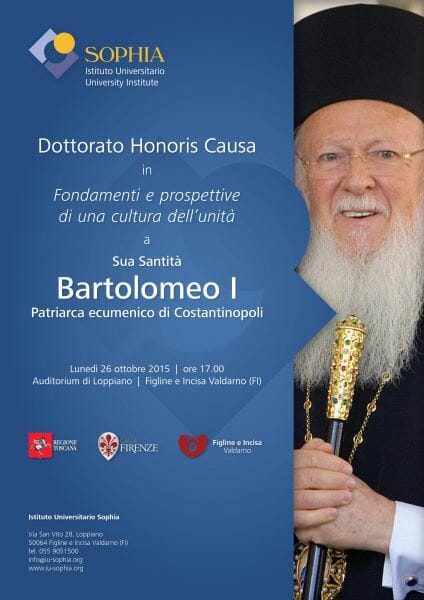
Oct 20, 2015 | Non categorizzato
 On October 26, 2015, at 5.00 pm
His Holiness Bartholomew I, Ecumenical Patriarch of Constantinople will be receiving the first honory doctoral degree in the culture of unity conferred by the Sophia University Institute, situated in Loppiano (Florence) and founded by Chiara Lubich to deal competently and effectively with the cultural transition taking place. The ceremony will be held on October 26 at 17.00 hrs at the Auditorium of the international Centre of the Focolare.The Patriarch, a pioneer in ecumenical dialogue and a peacemaker, is a point of reference in the complex contemporary scene. During some recent important historical events, he stood out for his leading role in promoting unity on several fronts. On May 25, 2014, at the end of the pilgrimage to Jerusalem, he joined Pope Francis in signing a declaration to confirm their respective churches’ commitment “towards unity for which Christ, our Lord prayed to the Father so ‘that all may be one’”. On June 8, 2014 he was at the Vatican together with President Mahmoud Abbas and President Shimon Peres to pray with the Pope for peace in the Holy Land. Bartholomew I is known for his spiritual environmental leadership.His teachings on the environment have been widely quoted by Pope Francis in his encyclical “Laudato si”. The Patriarch has been invited to address the assembly during the ecumenical service at Notre Dame Cathedral on December 3, at the time when the United Nations Climate Change Conference will be taking place in Paris.
The theologian Piero Coda, President of the University Institute said: “Today, the world needs people who seek the unity of the human family, and the Patriarch is constantly rendering a valuable service towards a culture that aims at placing fraternity at the heart of human history”. The recommendation specifies that: “The Ecumenical Patriarch of Constantinople is accredited for his active leading role in the ecumenical journey towards full Christian unity and in the dialogue with people of different beliefs and religions. He distinguishes himself for promoting justice, peace and protection of the environment, in conformity with the vision on humanity, history and the universe, that comes from the treasured spiritual and theological Eastern Orthodox Christian tradition”.
The Ecumenical Patriarch of Constantinople and the Focolare Movement – It all began with a meeting between Patriarch Athenagoras I and Chiara Lubich. “It was June 13, 1967”‐Lubich related‐ “The Patriarch welcomed me as if he had always known me and he asked me about the Movement’s contacts with the Lutherans and the Anglicans”. Between 1967 and 1972, Athenagoras met the founder of the Focolare Movement 23 times, and thus she became the messenger between Pope Paul VI and the Patriarch. This relationship continued with his successor, Demetrio I. Contacts with the current Ecumenical Patriarch Bartholomew I continue in the same spirit of spiritual friendship. His Holiness Bartholomew I, who visited Chiara Lubich at the Gemelli hospital a few days before her passing away on March 14, 2008 said: “I wanted to come here to give my personal greetings and those of the Ecumenical Patriarchate of Constantinople to dearest Chiara, who, through her life, has given and gives so much to the Church.I gave her my blessing with gratitude. I am happy to have met her.” Two years later, when he welcomed Maria Voce, the newly elected president of the Focolare Movement at the Phanar, he said “ I thank God for your friendship, your visit, the fruits of your Movement, and for the continuation of this work of God that gives glory to His name”.
This event takes place when Loppiano celebrates the first 50 years of its foundation, and it continues to strengthen the relationship of esteem and collaboration between the Patriarchate of Constantinople and the Focolare Movement.
On October 26, 2015, at 5.00 pm
His Holiness Bartholomew I, Ecumenical Patriarch of Constantinople will be receiving the first honory doctoral degree in the culture of unity conferred by the Sophia University Institute, situated in Loppiano (Florence) and founded by Chiara Lubich to deal competently and effectively with the cultural transition taking place. The ceremony will be held on October 26 at 17.00 hrs at the Auditorium of the international Centre of the Focolare.The Patriarch, a pioneer in ecumenical dialogue and a peacemaker, is a point of reference in the complex contemporary scene. During some recent important historical events, he stood out for his leading role in promoting unity on several fronts. On May 25, 2014, at the end of the pilgrimage to Jerusalem, he joined Pope Francis in signing a declaration to confirm their respective churches’ commitment “towards unity for which Christ, our Lord prayed to the Father so ‘that all may be one’”. On June 8, 2014 he was at the Vatican together with President Mahmoud Abbas and President Shimon Peres to pray with the Pope for peace in the Holy Land. Bartholomew I is known for his spiritual environmental leadership.His teachings on the environment have been widely quoted by Pope Francis in his encyclical “Laudato si”. The Patriarch has been invited to address the assembly during the ecumenical service at Notre Dame Cathedral on December 3, at the time when the United Nations Climate Change Conference will be taking place in Paris.
The theologian Piero Coda, President of the University Institute said: “Today, the world needs people who seek the unity of the human family, and the Patriarch is constantly rendering a valuable service towards a culture that aims at placing fraternity at the heart of human history”. The recommendation specifies that: “The Ecumenical Patriarch of Constantinople is accredited for his active leading role in the ecumenical journey towards full Christian unity and in the dialogue with people of different beliefs and religions. He distinguishes himself for promoting justice, peace and protection of the environment, in conformity with the vision on humanity, history and the universe, that comes from the treasured spiritual and theological Eastern Orthodox Christian tradition”.
The Ecumenical Patriarch of Constantinople and the Focolare Movement – It all began with a meeting between Patriarch Athenagoras I and Chiara Lubich. “It was June 13, 1967”‐Lubich related‐ “The Patriarch welcomed me as if he had always known me and he asked me about the Movement’s contacts with the Lutherans and the Anglicans”. Between 1967 and 1972, Athenagoras met the founder of the Focolare Movement 23 times, and thus she became the messenger between Pope Paul VI and the Patriarch. This relationship continued with his successor, Demetrio I. Contacts with the current Ecumenical Patriarch Bartholomew I continue in the same spirit of spiritual friendship. His Holiness Bartholomew I, who visited Chiara Lubich at the Gemelli hospital a few days before her passing away on March 14, 2008 said: “I wanted to come here to give my personal greetings and those of the Ecumenical Patriarchate of Constantinople to dearest Chiara, who, through her life, has given and gives so much to the Church.I gave her my blessing with gratitude. I am happy to have met her.” Two years later, when he welcomed Maria Voce, the newly elected president of the Focolare Movement at the Phanar, he said “ I thank God for your friendship, your visit, the fruits of your Movement, and for the continuation of this work of God that gives glory to His name”.
This event takes place when Loppiano celebrates the first 50 years of its foundation, and it continues to strengthen the relationship of esteem and collaboration between the Patriarchate of Constantinople and the Focolare Movement.
Source: Press Release 19 October 2015 Other material available at Focolare Information Service Bartholomew I – Biographical Profile Sophia University Institute – Dossier “Athenagoras I, Paul VI and Chiara Lubich” – video (available in high definition, please send your request to sif.press@focolare.org) Photo gallery
Oct 20, 2015 | Focolare Worldwide
http://vimeo.com/95726085 Jerusalem, May 24th: the encounter with Pope Francis and Patriarch Bartholomew recalls the historic embrace of 50 years ago between Paul VI and the Ecumenical Patriarch of Constantinople, Athenagoras I, which was the start of a new page in history following centuries of separation. We retrace this unedited page in the history of ecumenical dialogue.
Oct 19, 2015 | Non categorizzato
This is the title that has been chosen for the 9th UNESCO Youth Forum, which preceeds the UNESCO General Conference. Nancy Nanjala (Kenya) and Danilo Gomes (Brazil) will attend the Forum, representing the youth of the New Humanity NGO, which represents the Focolare Movement in international organisations. The event will be held at the UNESCO headquarters in Paris, on October 26–28, 2015.
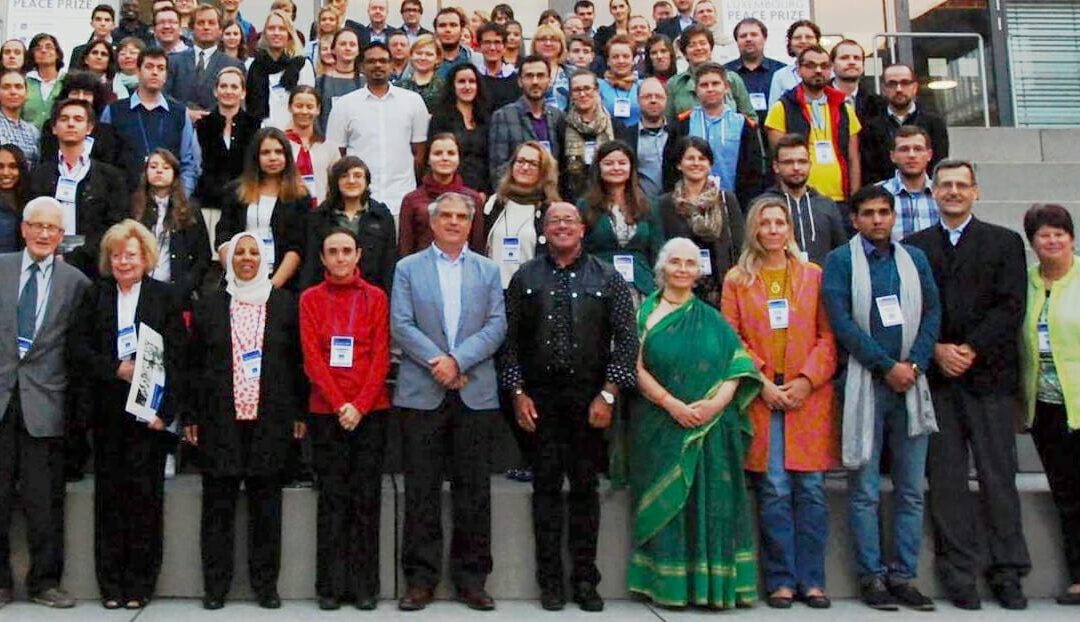
Oct 19, 2015 | Non categorizzato
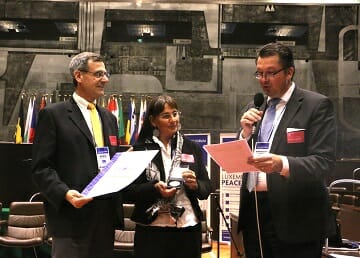 The prize, given by the Schengen Peace Foundation was assigned to New Humanity, an NGO that represents the Focolare Movement among international organisations, during the Youth World Peace Forum that both organisations had collaborated in organising at Rowad American College in Cairo last May, as part of the Living Peace Project that involves more than 80 thousand students and 200 schools around the world in planning and carrying out peace education projects. “After being so struck by the extraordinary volunteer work of so many young members of the Focolare Movement,” writes Dominicus Rhode, president of the forum and of the foundation, “we immediately decided to award the 2015 Luxembourg Peace Prize to New Humanity.” In accepting the award, Marco Desalvo, president of the organisation, remarked: “We are especially pleased because this was the reason for which New Humanity was begun, to contribute to the creation of the unity of the human family, respecting everyone’s identity, and and promoting the spirit of universal brotherhood. This is an award for which we are grateful, but mostly an encouragement to continue on with our work.” While describing the activities of New Humanity in the world’s ‘hot spots’ like Syria and the Middle East, but also in Europe, Desalvo, vice president Cecilia Landucci and Anita Martinez also announced the beginning of a collection of signatures for a petition that would be taken to international leaders and to the United Nations: “In this appeal,” he explained, “we ask all governments to fight extreme poverty with renewed commitment to reducing inequality; to continue in the effort to guarantee a basic education for everyone; to reduce public spending for arms so as to free up resources for development; to take a second look at the current systems of government in terms of a greater democratic control of economic and monetary politics; and to adopt new systems and applications of the laws to fight organised crime.”
The prize, given by the Schengen Peace Foundation was assigned to New Humanity, an NGO that represents the Focolare Movement among international organisations, during the Youth World Peace Forum that both organisations had collaborated in organising at Rowad American College in Cairo last May, as part of the Living Peace Project that involves more than 80 thousand students and 200 schools around the world in planning and carrying out peace education projects. “After being so struck by the extraordinary volunteer work of so many young members of the Focolare Movement,” writes Dominicus Rhode, president of the forum and of the foundation, “we immediately decided to award the 2015 Luxembourg Peace Prize to New Humanity.” In accepting the award, Marco Desalvo, president of the organisation, remarked: “We are especially pleased because this was the reason for which New Humanity was begun, to contribute to the creation of the unity of the human family, respecting everyone’s identity, and and promoting the spirit of universal brotherhood. This is an award for which we are grateful, but mostly an encouragement to continue on with our work.” While describing the activities of New Humanity in the world’s ‘hot spots’ like Syria and the Middle East, but also in Europe, Desalvo, vice president Cecilia Landucci and Anita Martinez also announced the beginning of a collection of signatures for a petition that would be taken to international leaders and to the United Nations: “In this appeal,” he explained, “we ask all governments to fight extreme poverty with renewed commitment to reducing inequality; to continue in the effort to guarantee a basic education for everyone; to reduce public spending for arms so as to free up resources for development; to take a second look at the current systems of government in terms of a greater democratic control of economic and monetary politics; and to adopt new systems and applications of the laws to fight organised crime.” 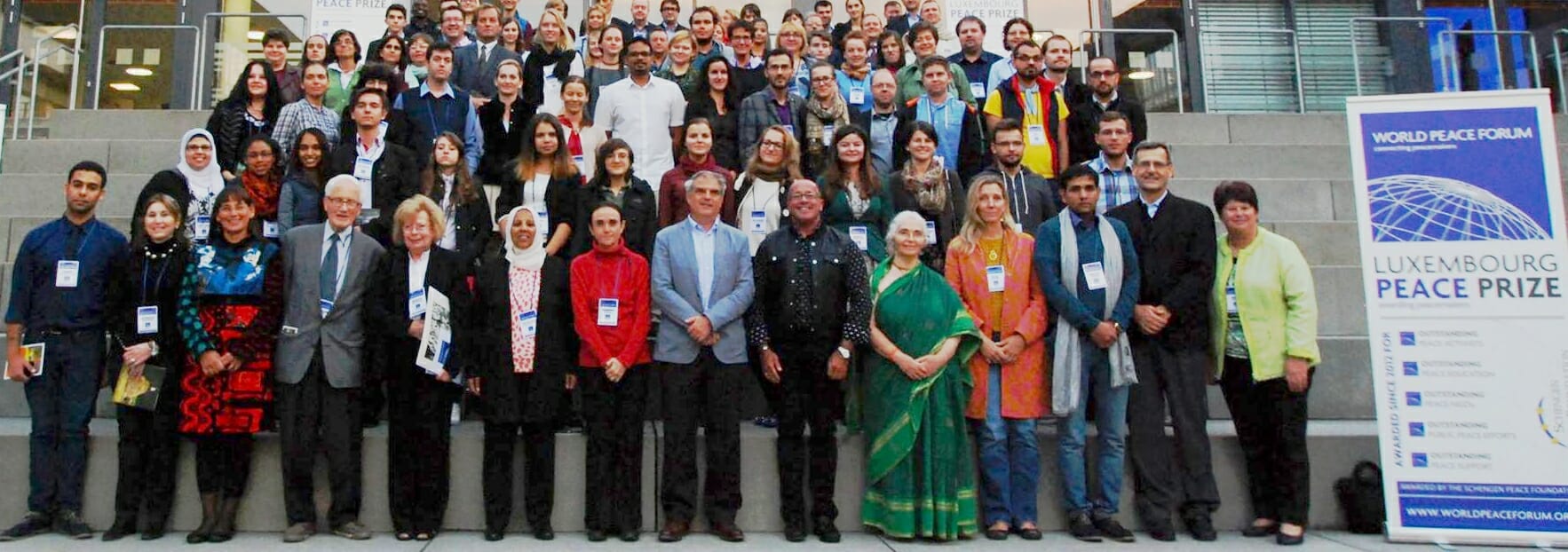 The Youth World Youth Peace Forum, within which the prize was awarded, is a global platform for improving the exchange of best practices amongst associations and individuals active in the area of peace, and joins a large number of professionals from all backgrounds from around the world, who share their hope. Several presentations highlighted ways of coming up with peaceful alternatives to conflicts which have always proven to be more efficacious, at all levels and from every standpoint – rather than war. Testimonies were also given by Syrian refugees and people from other lands, as well as by those who welcomed them in, and of others who are currently giving medical, artistic, and spiritual contributions to peace. The next Forum will be held in Florianopolis, Brazil, in September 2016. Preparations are already underway, but the end goal of all the work involves an ongoing daily commitment and involvement, as was expressed in many of the impressions and testimonies that were shared. One Syrian woman, for example, was asked what she would say to her Focolare friends who stayed behind in Aleppo, Damascus and other places in Syria. She answered: “Life is precious. If they are still in Syria, it is because they have a duty, and a message to bring. Those who cross and leave Syria must continue the work, with the same spirit of the people who could not leave the country. I continually pray to God that He will stop the war and save us from this tragedy, so that all can live in peace.”
The Youth World Youth Peace Forum, within which the prize was awarded, is a global platform for improving the exchange of best practices amongst associations and individuals active in the area of peace, and joins a large number of professionals from all backgrounds from around the world, who share their hope. Several presentations highlighted ways of coming up with peaceful alternatives to conflicts which have always proven to be more efficacious, at all levels and from every standpoint – rather than war. Testimonies were also given by Syrian refugees and people from other lands, as well as by those who welcomed them in, and of others who are currently giving medical, artistic, and spiritual contributions to peace. The next Forum will be held in Florianopolis, Brazil, in September 2016. Preparations are already underway, but the end goal of all the work involves an ongoing daily commitment and involvement, as was expressed in many of the impressions and testimonies that were shared. One Syrian woman, for example, was asked what she would say to her Focolare friends who stayed behind in Aleppo, Damascus and other places in Syria. She answered: “Life is precious. If they are still in Syria, it is because they have a duty, and a message to bring. Those who cross and leave Syria must continue the work, with the same spirit of the people who could not leave the country. I continually pray to God that He will stop the war and save us from this tragedy, so that all can live in peace.”
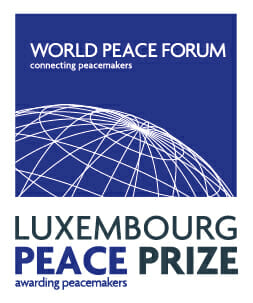
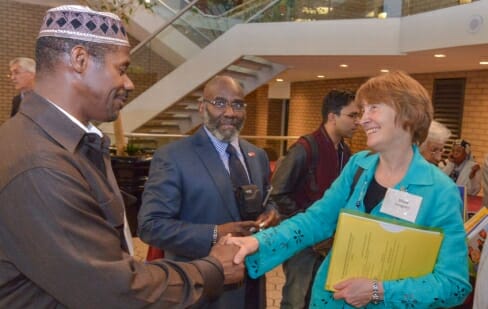
Oct 18, 2015 | Non categorizzato
 “Inculturation of faith is an intrinsic aspect of Christianity. This regards the difficult and complex processes that need time, and in this process the local people themselves are particularly important. By living the Gospel authentically, they who are already deeply rooted in their own cultures will draw forth those adaptations which they will then share with the others, through the customs, artistic expressions and mindsets of their own people. I am totally convinced that the important thing is God himself. This obviously does not mean that one can remain inactive or indifferent. Also we are gathering for example, the African proverbs or those of other peoples, and our publishing house has published books on the great religions. Chiara Lubich established a school for inculturation in Africa , after which she launched another one in Latin America. But whoever thinks that it would suffice to study the various cultures in order to make relate with the Gospel teachings, would be going down the wrong path. We have to bring God. He is the one open and fully ‘involved’ in what He himself created and He will be the one to achieve inculturation. Of course, there are many forms of inculturation and many attempts that should be encouraged and blessed. However, only God can achieve real inculturation. The greatest contribution we can give is love. If each one gives of himself, foregoing one’s own self in the other, and accepting the other in oneself, then the personality of each one will flourish at best and complete the personality of each one. The same would occur among peoples: if each people is able to “lose” its culture out of love, and open out to God in the other, the best of each culture would be “saved” and each would emerge and be enriched not only in the spiritual but also the humane, cultural, and ethnic aspects. Initially, the journey will be slow, but once the road has been paved, it will accelerate and bring enormous results.”
“Inculturation of faith is an intrinsic aspect of Christianity. This regards the difficult and complex processes that need time, and in this process the local people themselves are particularly important. By living the Gospel authentically, they who are already deeply rooted in their own cultures will draw forth those adaptations which they will then share with the others, through the customs, artistic expressions and mindsets of their own people. I am totally convinced that the important thing is God himself. This obviously does not mean that one can remain inactive or indifferent. Also we are gathering for example, the African proverbs or those of other peoples, and our publishing house has published books on the great religions. Chiara Lubich established a school for inculturation in Africa , after which she launched another one in Latin America. But whoever thinks that it would suffice to study the various cultures in order to make relate with the Gospel teachings, would be going down the wrong path. We have to bring God. He is the one open and fully ‘involved’ in what He himself created and He will be the one to achieve inculturation. Of course, there are many forms of inculturation and many attempts that should be encouraged and blessed. However, only God can achieve real inculturation. The greatest contribution we can give is love. If each one gives of himself, foregoing one’s own self in the other, and accepting the other in oneself, then the personality of each one will flourish at best and complete the personality of each one. The same would occur among peoples: if each people is able to “lose” its culture out of love, and open out to God in the other, the best of each culture would be “saved” and each would emerge and be enriched not only in the spiritual but also the humane, cultural, and ethnic aspects. Initially, the journey will be slow, but once the road has been paved, it will accelerate and bring enormous results.”
Pasquale Foresi
Excerpt from:Pasquale Foresi,Colloqui, New City Press 2009, pp.133-136. Collection of conversations with members of the Focolare Movement dated 1990/98
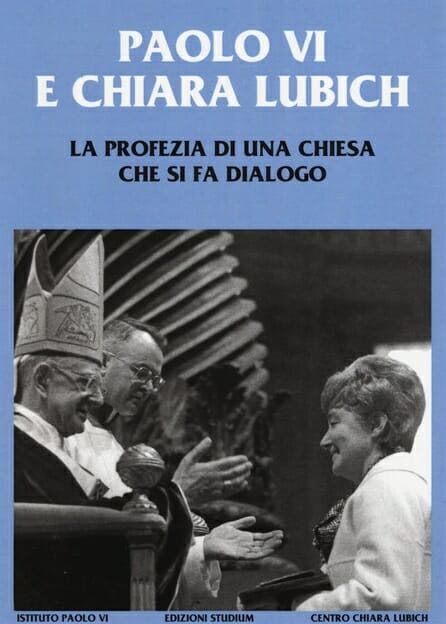
Oct 17, 2015 | Non categorizzato
 «Along the years, there have been studies and in-depth reflections on the Foundress of the Focolare Movement and Paul VI, the “helmsman of Vatican II.” But the time was not ripe for the deepening of the providential weft of relationships established between Giovanni Battista Montini and Chiara Lubich traced precisely to that period. A Pope and a lay woman: what could they have had in common? History never fails to surprise us, and the works carried out by the Paolo VI Institute and the Chiara Lubich Centre resulted in the two study days of 7/8 November 2014, centered on Paul VI, Chiara Lubich and the prophecy of a Church that impersonates dialogue. All these activities have contributed to this long-awaited publication. The book, published in July 2015, traces those events that had revealed under a historical, social, ecclesial, ecumenical and theological profile, the relationship that began in 1952 between Chiara Lubich and Montini, then the special deputy of the Secretary of State, and which continued up to the death of Paul VI in 1978. The path highlighted important moments for both the Church and the Focolare Movement, with the charismatic drive which distinguished it from the very beginning when it made its first steps in the city of Trent. As seen in the studies of the 1950s, the ecclesiastical authorities nurtured strong doubts with regard to the novelty the Movement represented, and the overcoming of this stance towards the start of the 1960s with the first approvals. At this stage, Paul VI played a fundamental role through his personal commitment in the progressive, juridical and institutional configuration of the Movement. Still quite an unknown but a highly interesting topic, it related to the presence of the Focolare in the Eastern European countries from the start of the 1960s, at the height of the Cold War, along with the intensification of contacts in the ecumenical field that came about in the same period. This account is extensively documented by an intense exchange of letters between Chiara and Paul VI, and of what Lubich wrote in her diary after the audiences with Pope Montini. The events also highlighted, alongside these two figures, the role of Igino Giordani. He was a personal friend of Paul VI who, when still a young bishop in Rome, used to frequent his home. In those times Giordani was the Vatican librarian, and future member of the Constituent assembly and Cofounder of the Focolare Movement with Chiara Lubich. Maria Voce, President of the Focolare, stressed that «there is a profound consonance which particularly reveals Pope Paul’s extreme sensitivity and capacity to see in the charism God endowed to Chiara Lubich, the work of the Holy Spirit at the crucial moment of the celebration of the Second Vatican Council that opened out to dialogue beyond frontiers. Upon meeting Chiara, he listened, appreciated, and encouraged. In 1964, struck by the ecumenical feature of the Movement, he exhorted: ”In the same way as you have started a dialogue with the non-Catholic Christians, do the same also with those who do not profess a faith.”» «This was underlined by Don Angelo Maffeis, president of the Paul VI Institute: “the beginnings of this story traces back to long before the Second Vatican Council and deserves to be reconstructed so as to highlight the background of personal contacts and ecclesial experiences that gradually led to the full development of the orientations set by Paul VI in the course of his pontificate.» The other works by Andrea Riccardi, Alberto Monticone, Lucia Abignente, Paolo Siniscalco, Joan Patricia Back, Alberto Lo Presti, Adriana Cosseddu and Piero Coda – have focused under various aspects, «the grandeur of the prophecy of a Church that became the personification of dialogue.» Two charisms met, recognised one another, and worked together to make the Church a “house of communion,” which sets itself in dialogue with the world. The volume on Paul VI and Chiara Lubich, the prophecy of a Church that personifies dialogue, was curated by Paolo Siniscalco and Xenio Toscani, and edited by ‘Studium.’» Caterina Ruggiu
«Along the years, there have been studies and in-depth reflections on the Foundress of the Focolare Movement and Paul VI, the “helmsman of Vatican II.” But the time was not ripe for the deepening of the providential weft of relationships established between Giovanni Battista Montini and Chiara Lubich traced precisely to that period. A Pope and a lay woman: what could they have had in common? History never fails to surprise us, and the works carried out by the Paolo VI Institute and the Chiara Lubich Centre resulted in the two study days of 7/8 November 2014, centered on Paul VI, Chiara Lubich and the prophecy of a Church that impersonates dialogue. All these activities have contributed to this long-awaited publication. The book, published in July 2015, traces those events that had revealed under a historical, social, ecclesial, ecumenical and theological profile, the relationship that began in 1952 between Chiara Lubich and Montini, then the special deputy of the Secretary of State, and which continued up to the death of Paul VI in 1978. The path highlighted important moments for both the Church and the Focolare Movement, with the charismatic drive which distinguished it from the very beginning when it made its first steps in the city of Trent. As seen in the studies of the 1950s, the ecclesiastical authorities nurtured strong doubts with regard to the novelty the Movement represented, and the overcoming of this stance towards the start of the 1960s with the first approvals. At this stage, Paul VI played a fundamental role through his personal commitment in the progressive, juridical and institutional configuration of the Movement. Still quite an unknown but a highly interesting topic, it related to the presence of the Focolare in the Eastern European countries from the start of the 1960s, at the height of the Cold War, along with the intensification of contacts in the ecumenical field that came about in the same period. This account is extensively documented by an intense exchange of letters between Chiara and Paul VI, and of what Lubich wrote in her diary after the audiences with Pope Montini. The events also highlighted, alongside these two figures, the role of Igino Giordani. He was a personal friend of Paul VI who, when still a young bishop in Rome, used to frequent his home. In those times Giordani was the Vatican librarian, and future member of the Constituent assembly and Cofounder of the Focolare Movement with Chiara Lubich. Maria Voce, President of the Focolare, stressed that «there is a profound consonance which particularly reveals Pope Paul’s extreme sensitivity and capacity to see in the charism God endowed to Chiara Lubich, the work of the Holy Spirit at the crucial moment of the celebration of the Second Vatican Council that opened out to dialogue beyond frontiers. Upon meeting Chiara, he listened, appreciated, and encouraged. In 1964, struck by the ecumenical feature of the Movement, he exhorted: ”In the same way as you have started a dialogue with the non-Catholic Christians, do the same also with those who do not profess a faith.”» «This was underlined by Don Angelo Maffeis, president of the Paul VI Institute: “the beginnings of this story traces back to long before the Second Vatican Council and deserves to be reconstructed so as to highlight the background of personal contacts and ecclesial experiences that gradually led to the full development of the orientations set by Paul VI in the course of his pontificate.» The other works by Andrea Riccardi, Alberto Monticone, Lucia Abignente, Paolo Siniscalco, Joan Patricia Back, Alberto Lo Presti, Adriana Cosseddu and Piero Coda – have focused under various aspects, «the grandeur of the prophecy of a Church that became the personification of dialogue.» Two charisms met, recognised one another, and worked together to make the Church a “house of communion,” which sets itself in dialogue with the world. The volume on Paul VI and Chiara Lubich, the prophecy of a Church that personifies dialogue, was curated by Paolo Siniscalco and Xenio Toscani, and edited by ‘Studium.’» Caterina Ruggiu

 “I live in Nicosia and was born and grew up in an Orthodox family that was Christian in name only. There was no depth, no relationship with Jesus. Indeed, God was the ally of my parents, and they seemed to have a monopoly on Him when they wanted us to obey them. When I finished high school, I received a scholarship to study orthodontics in Hungary. It was difficult for me to get used to the new sitaution. For the first time I was far from my family, living with people I didn’t know. Back then, we were far from the multicultural spirit that prevails today. I was filled with prejudices, with an attitude of rejection. During that year I encountered many disappointments, also from my friends. Meanwhile, the deep search for a more authentic life had begun in me. At the new college I met a Hungarian girl. I had been struck by her cheerfulness and also the way she accepted others. She even offered to help me learn Hungarian. Disappointed by my previous experience with friends, her way of acting made me wonder: ‘Is she sincere, or only kidding?’ But . . . I began to trust her. We shared joys, sorrows, failures and also material things. When she went home to her family on the weekends, around 50 km from Budapest, she took me along so that I wouldn’t be missing my own family. Her family were farmers, very loving, warm and hospitable. But there was one question: Every day at the same hour, and one evening every week she would disappear without explanation. All I knew was that she was with other friends. It turns out that she was with several young women who belonged to the growing Focolare community in Hungary. Back then – when were under the Socialist Regime – anyone discovered belonging to a religious movement was persecuted with serious consequences, such as loss of one’s job, or place at university. One day she felt comfortable enough to confide in me. She told me how she had come to know the Focolare Movement. A priest from her village had recounted to her the story of Chiara Lubich, a young woman like us, of our same age, and how she had been struck by the fact that during the Second World War, Chiara saw everything crumbling around her and the only ideal that didn’t crumble under the bombs was God. She wanted God to be her ideal in life, and to live according to His will. She explained to me that she and those young women she met with were trying to do the same thing. They placed God first in their life, living the Word of Life each day, a sentence taken from the Gospel with an explanation by Chiara. Then they recounted their daily experiences to each other, as a gift for each other. Everything she told me touched me so deeply, I began reading the New Testament, which I had never done before, and this was a decisive moment for my future. Life began to change. All the people I met each day, I could no longer ignore them, nor judge them, nor undervalue them, because now a new mentality had been born in me: we’re all children of One Father and therefore brothers and sisters to each other. Every person is a candidate for the unity that Jesus asked of His Father: that all may be one: the good, the bad, the ugly, the unlikeable, the big and the small. . . The theology of the Fathers had been awakened in me, especically that saying of Saint John Chrysostom: ‘I see my brother, I see my God’. The walls of prejudice that I built up within me, began to crumble. I realised that the Gospel was not only something to be read out in church and that was it; rather, it could bring about a revolution if we took it seriously and translated it into daily life: at the university, at the factory, at the hospital, in the family! Amidst all of this enthusiasm and joy that was filling my life, there was one great sorrow: The other girls were all Catholics, and I was the only Orthodox. They attended Mass every day. I strongly desired to be with them in those moments, but they suggested that I look for my Orthodox Church in Budapest so that I could attend the Liturgy and receive the Eucharist. This separation was painful, but Chiara had invited the members of the Movement belonging to other Christian Churches, to love their Churches, just as she had loved hers. This explanation gave me peace and, once again, it confirmed in me the wisdom, love and descretion that Chiara possessed in front of the believers of different Churches. It could not have been anything but the fruit of God’s intervention in our times. I found the Orthodox parish and got to know it more. I went every Sunday and, with the permission of the priest was able to receive Holy Communion any time there was a Divine Liturgy. They never left me alone in this new initiative. The other young Catholic women often attended the Liturgy with me. The liturgical and sacramental life was no longer something formal or external, but a relationship that was building with Jesus, the activation of God’s grace in my heart that helped in the daily struggles and increased the fruits of love, joy and peace within me.” At Istanbul, March 14, 2015, on the occasion of the publication of the Greek editions of Chiara Lubich’s writings.
“I live in Nicosia and was born and grew up in an Orthodox family that was Christian in name only. There was no depth, no relationship with Jesus. Indeed, God was the ally of my parents, and they seemed to have a monopoly on Him when they wanted us to obey them. When I finished high school, I received a scholarship to study orthodontics in Hungary. It was difficult for me to get used to the new sitaution. For the first time I was far from my family, living with people I didn’t know. Back then, we were far from the multicultural spirit that prevails today. I was filled with prejudices, with an attitude of rejection. During that year I encountered many disappointments, also from my friends. Meanwhile, the deep search for a more authentic life had begun in me. At the new college I met a Hungarian girl. I had been struck by her cheerfulness and also the way she accepted others. She even offered to help me learn Hungarian. Disappointed by my previous experience with friends, her way of acting made me wonder: ‘Is she sincere, or only kidding?’ But . . . I began to trust her. We shared joys, sorrows, failures and also material things. When she went home to her family on the weekends, around 50 km from Budapest, she took me along so that I wouldn’t be missing my own family. Her family were farmers, very loving, warm and hospitable. But there was one question: Every day at the same hour, and one evening every week she would disappear without explanation. All I knew was that she was with other friends. It turns out that she was with several young women who belonged to the growing Focolare community in Hungary. Back then – when were under the Socialist Regime – anyone discovered belonging to a religious movement was persecuted with serious consequences, such as loss of one’s job, or place at university. One day she felt comfortable enough to confide in me. She told me how she had come to know the Focolare Movement. A priest from her village had recounted to her the story of Chiara Lubich, a young woman like us, of our same age, and how she had been struck by the fact that during the Second World War, Chiara saw everything crumbling around her and the only ideal that didn’t crumble under the bombs was God. She wanted God to be her ideal in life, and to live according to His will. She explained to me that she and those young women she met with were trying to do the same thing. They placed God first in their life, living the Word of Life each day, a sentence taken from the Gospel with an explanation by Chiara. Then they recounted their daily experiences to each other, as a gift for each other. Everything she told me touched me so deeply, I began reading the New Testament, which I had never done before, and this was a decisive moment for my future. Life began to change. All the people I met each day, I could no longer ignore them, nor judge them, nor undervalue them, because now a new mentality had been born in me: we’re all children of One Father and therefore brothers and sisters to each other. Every person is a candidate for the unity that Jesus asked of His Father: that all may be one: the good, the bad, the ugly, the unlikeable, the big and the small. . . The theology of the Fathers had been awakened in me, especically that saying of Saint John Chrysostom: ‘I see my brother, I see my God’. The walls of prejudice that I built up within me, began to crumble. I realised that the Gospel was not only something to be read out in church and that was it; rather, it could bring about a revolution if we took it seriously and translated it into daily life: at the university, at the factory, at the hospital, in the family! Amidst all of this enthusiasm and joy that was filling my life, there was one great sorrow: The other girls were all Catholics, and I was the only Orthodox. They attended Mass every day. I strongly desired to be with them in those moments, but they suggested that I look for my Orthodox Church in Budapest so that I could attend the Liturgy and receive the Eucharist. This separation was painful, but Chiara had invited the members of the Movement belonging to other Christian Churches, to love their Churches, just as she had loved hers. This explanation gave me peace and, once again, it confirmed in me the wisdom, love and descretion that Chiara possessed in front of the believers of different Churches. It could not have been anything but the fruit of God’s intervention in our times. I found the Orthodox parish and got to know it more. I went every Sunday and, with the permission of the priest was able to receive Holy Communion any time there was a Divine Liturgy. They never left me alone in this new initiative. The other young Catholic women often attended the Liturgy with me. The liturgical and sacramental life was no longer something formal or external, but a relationship that was building with Jesus, the activation of God’s grace in my heart that helped in the daily struggles and increased the fruits of love, joy and peace within me.” At Istanbul, March 14, 2015, on the occasion of the publication of the Greek editions of Chiara Lubich’s writings.












